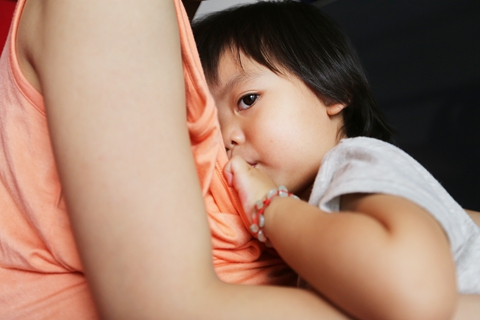China’s Baby-Policy Pendulum Could Be Swinging the Other Way

Two Nanjing University academics made a modest proposal for reversing China’s baby bust: setting up a fertility fund to collect money from young couples until they have a second child to encourage childbearing.
Their idea, outlined in an article published by the government-backed Xinhua Daily in Jiangsu province, quickly went viral. One internet user called it “nonsense,” and another objected to the prospect of heavy-handed government involvement.
Two years after China scrapped its decades-long one-child policy and allowed families to have two children, the country is still struggling with falling fertility that threatens the economy like a time bomb. The birth rate is plunging just as the number of women capable of childbearing is about to drop.
To reverse this, China needs not only to drop the two-child limit but also to use tax incentives and improve maternity policies to get families to have more babies, wrote the Nanjing economic scholars Liu Zhibiao and Zhang Ye in the newspaper.
While some of their suggested measures echoed public calls, their proposal to set up a fertility fund with public contribution stirred controversy. Citizens under the age of 40 should be required to contribute to a newly established fertility fund until they have two children. The money will be used to subsidize families with more children, while those who don’t have at least two children will be allowed to take the money back only when they retire, the authors wrote.
“Such measure is nonsense,” wrote an internet user identified as Xu Yuanzhi on China’s popular Twitter-like service Weibo. “The government can use all measures to encourage fertility, but not by taxing those who don’t want to.”
“Forcing people to give birth has no difference from birth control,” wrote another user identified as Tianshengshou. “The government should create conditions to allow people to choose freely how many children they want to have, rather than requiring them to do.”
Some of the online objections were on-point, according to He Yafu, a demographic scholar. He argued that the Nanjing academics were suggesting the wrong solution. The government should instead encourage fertility through policies to reduce the financial burden of raising children, such as tax reductions and subsidies for health care and education.
China ended its harsh one-child policy after nearly four decades in 2016, allowing couples to have two children. But that failed to deliver a baby boom as many young couples face fierce competition in the workplace and rising costs of child care.
Meanwhile, the number of women who can give birth is on the verge of declining. According to the Xinhua Daily article, the number of women of childbearing age will drop by 40% within the next 10 years.
China had 17.23 million births in 2017, down 630,000 from a year earlier, according to China’s National Bureau of Statistics. This year, births will probably drop to 15 million, according to Huang Wenzheng, a senior guest researcher with the Center for China and Globalization, citing his own research.
The aging population will pose a significant challenge to the country’s economic outlook, experts warned. Many have suggested further policy relaxation to allow people to have as many children as they want.
The proposal of setting up a fertility fund would put a heavier burden on families, including many of those who have only one child, according to He, the demographer. China’s existing official social welfare and insurance contributions account for nearly 40% of people’s average income, a relatively high level, He said.
The fertility fund proposal followed rumors circulated online that some local governments required newly married couples to submit a 5,000 yuan ($723) deposit that would be returned only after they have a second child. The civil affairs department denied any such practice.
He said both the fertility fund and the rumored deposit would punish people with fewer children, which is not the right solution for China’s population challenge.
Contact reporter Han Wei (weihan@caixin.com)

- 1Cover Story: China Carves Out a Narrow Path for Offshore Asset Tokenization
- 2Drownings Shake Chinese Enthusiasm for Travel to Russia
- 3Over Half of China’s Provinces Cut Revenue Targets
- 4Li Ka-Shing’s Port Empire Hit by Forced Takeover Amid Panama Legal Dispute
- 5In Depth: China’s Mutual Fund Industry Faces Overhaul After a Banner 2025
- 1Power To The People: Pintec Serves A Booming Consumer Class
- 2Largest hotel group in Europe accepts UnionPay
- 3UnionPay mobile QuickPass debuts in Hong Kong
- 4UnionPay International launches premium catering privilege U Dining Collection
- 5UnionPay International’s U Plan has covered over 1600 stores overseas






